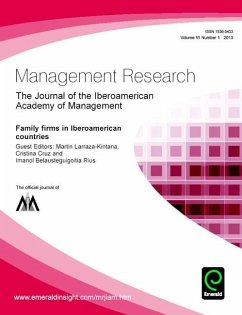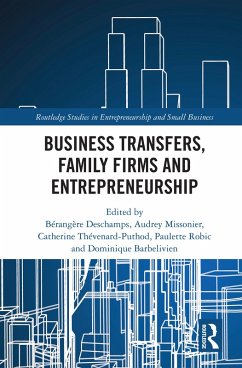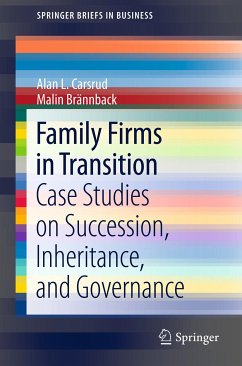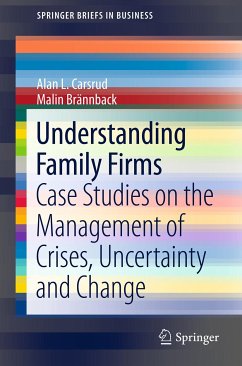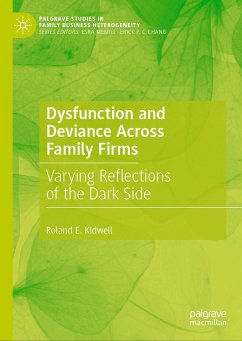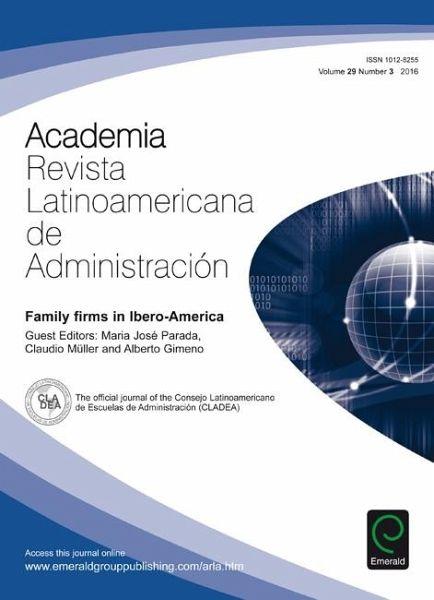
Family firms in Ibero-America (eBook, PDF)

PAYBACK Punkte
53 °P sammeln!
This eBook focuses on family firms in Ibero-America. Family firms are ubiquitous around the world. A reality that is on the rise, research wise, yet still little recognized. In the last three decades there has been a boost in researching family business, mainly in North America and Europe. Understanding other contexts can bring interesting insights, since context influences the way a family firm behaves, based on its culture, and its level of development, among other factors. Ibero-America is a fertile ground to delve into specific aspects that family firms in this region may display given the...
This eBook focuses on family firms in Ibero-America. Family firms are ubiquitous around the world. A reality that is on the rise, research wise, yet still little recognized. In the last three decades there has been a boost in researching family business, mainly in North America and Europe. Understanding other contexts can bring interesting insights, since context influences the way a family firm behaves, based on its culture, and its level of development, among other factors. Ibero-America is a fertile ground to delve into specific aspects that family firms in this region may display given their embeddedness in an emerging economy, mainly driven by exploitation of natural resources, and a collectivist culture where close relationships are important. This eBook includes studies from a variety of countries (two from Spain, one from Chile, and one from Mexico). Three of them compare family vs non-family firms in different dimensions related to the use of external advice, innovation, and management practices. A second major topic is innovation, as seen in two studies that focus on innovation strategies and barriers to innovation. Finally, a third major area of study is corporate governance, in the form of a literature review. With regard to family vs non-family firms comparison, Benito-Hernandez, et al. find that family firms tend to use less HR services due to their smaller size and therefore more limited resources and less complex structures, and also due to nepotism hindering the use of more sophisticated HR services. Family firms tend to use legal advice, for reasons other than size, such as succession and tax/inheritance issues. Basco and Calabro show specific differences in SMEs' innovation strategies as seen in the next section. Garces-Galdeano, et al. compare management capabilities in Spanish firms, finding that family firms tend to have a lower degree of management practices in place. In addition, family-managed companies seem to have less managerial capability than those managed by non-family members. Regarding Innovation in family firms, which empirically has received little attention, Basco and Calabro in their study of Chilean firms find that family SMEs search for new ideas and knowledge within their closest network (e.g., customers, suppliers, and competitors), whereas non-family SMEs mainly focus on broader network relationships (e.g., universities, public institutions, fair trades). Founding generations are more likely than next-generation members to be involved in internal innovation activities. Palma-Ruiz et al. focus on what hampers innovation in Mexican family firms: finding that lack of information about market and technologies, and lack of demand for innovation hinder the predisposition of family firms to engage in innovation. Based on ownership and family management control, they show that knowledge factors are an important barrier when firms have a strong familiar control, constraining the availability of information, and hindering particularly the initial stages of innovation. Finally, with regards to governance, Botero and Lagos performed a literature review in Ibero-America reviewing 34 articles. They show that most studies focus on board of directors/ top management team (12 articles), ownership issues related to rights or concentration of shares (10 articles), and a combination of both topics (12 articles). Some relevant conclusions include that the relationship between different governance mechanisms is covered more in Ibero-American studies - a missing step in most studies about corporate governance (for an exception see Parada, 2015). Boards of directors seem to have an advisory role rather than supervisory role. In Mexico top management team show a low rotation of their members leading to lower performance. Family governance is little researched.
Dieser Download kann aus rechtlichen Gründen nur mit Rechnungsadresse in A, B, BG, CY, CZ, D, DK, EW, E, FIN, F, GR, HR, H, IRL, I, LT, L, LR, M, NL, PL, P, R, S, SLO, SK ausgeliefert werden.





